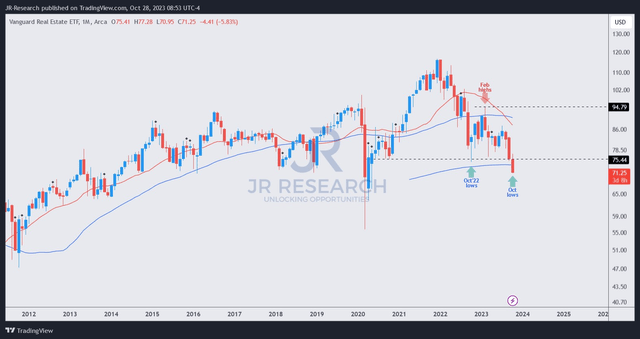The market hasn’t been kind to real estate investors all year, as the Vanguard Real Estate ETF (NYSEARCA:VNQ) underperformed the S&P 500 (SPX) (SPY) significantly since my previous caution in December 2022. However, the underperformance of VNQ exceeded my expectations, suggesting market sentiments on real estate stocks remain highly pessimistic. Contrarian REIT investors have also been caught napping, as the initial mean-reversion thesis from VNQ’s October 2022 lows was crushed.
Accordingly, VNQ took out a new 52-week low in early October 2023 and crumbled further this week, reaching levels last seen in mid-2020. As such, I gleaned that dip buyers from VNQ’s October 2022 lows likely threw in the towel, expecting a further selloff to continue. But why? Here are the key reasons.
Blame the Surge in Long-term Bond Yields.
Accordingly, the 10Y Treasury yield (US10Y) surged to the 5% zone this week, busting the levels in October 2022. My price action analysis suggests the recent surge invalidated a bull trap (false upside breakdown) in the US10Y. In other words, the conviction in selling bonds has gained significant momentum, suggesting long-duration bond investors could be in further trouble. As such, the bullish bias in the US10Y has regained traction.
We saw how the rate-sensitive Utilities (XLU) sector was hit incredibly hard, as XLU also fell to lows last seen in May 2020. As such, with REITs also highly sensitive to changes in long-term interest rates, the battering should have been anticipated.
Leading Stocks Aren’t Undervalued
| Rank | Company Name | Weight (%) |
|---|---|---|
| 1 | Vanguard Real Estate II Index | 12.67 |
| 2 | Prologis, Inc. (PLD) | 7.50 |
| 3 | American Tower Corp (AMT) | 5.55 |
| 4 | Equinix, Inc. (EQIX) | 4.92 |
| 5 | Public Storage (PSA) | 3.02 |
| 6 | Crown Castle Inc. (CCI) | 2.89 |
| 7 | Welltower Inc. (WELL) | 2.84 |
| 8 | Simon Property Group, Inc. (SPG) | 2.48 |
| 9 | Realty Income Corp (O) | 2.43 |
| 10 | Digital Realty Trust, Inc. (DLR) | 2.42 |
| Total | 46.74 |
VNQ top holdings. Data source: Seeking Alpha
The top ten holdings in VNQ accounted for nearly 47% of the ETF’s weighting. Accordingly, VNQ tracks the MSCI US Investable Market Real Estate 25/50 Index closely, aiming to “replicate the performance of this specific index.”
The ETF is well-diversified, representing various exposure, such as data center REITs (8.6%), health care REITs (8.2%), industrial REITs (12.9%), multi-family residential REITs (8.8%), and office REITs (4.5%). These REITs help to anchor VNQ’s performance, providing broad real estate exposure to its investors.

VNQ top holdings Quant Grades (Seeking Alpha)
Notwithstanding VNQ’s battering, the valuation grades of their top holdings suggest they aren’t in the significantly undervalued zones relative to their sector peers. Also, considering VNQ’s trailing twelve-month dividend yield of 5.04%, it doesn’t offer an attractive spread against what the 2Y Treasury yield (US2Y) last printed at 5%. As such, I believe the downward de-rating in VNQ in October 2023 was appropriate, as the market needed to reflect these headwinds.
And if VNQ investors think a spread of 0.04% against the US2Y is sufficient to justify the risk/reward, I believe a continued surge in bond yields could provide a harsh dose of reality.
VNQ’s Price Action Is Bearish

VNQ price chart (monthly) (TradingView)
Based on VNQ’s long-term chart, I gleaned that its price action invalidated a supposedly robust bear trap (false downside breakdown) that dip-buyers helped validate in October 2022.
As such, the downward de-rating likely led to intensified technical selling as VNQ broke decisively below a critical support zone ($75 level). Although VNQ could still form a bullish reversal at the current levels, that’s no longer my base case with the recent price action development.
Bears could push VNQ further down, exploiting the gap toward its March 2020 lows if the surge in bond yields continues without respite. With no valuation dislocation in sight for VNQ at the current levels, it’s time for dip buyers to call it a day and move on.
Rating: Downgraded to Sell
Important note: Investors are reminded to do their due diligence and not rely on the information provided as financial advice. Please always apply independent thinking and note that the rating is not intended to time a specific entry/exit at the point of writing unless otherwise specified.
We Want To Hear From You
Have constructive commentary to improve our thesis? Spotted a critical gap in our view? Saw something important that we didn’t? Agree or disagree? Comment below with the aim of helping everyone in the community to learn better!
Read the full article here









Leave a Reply